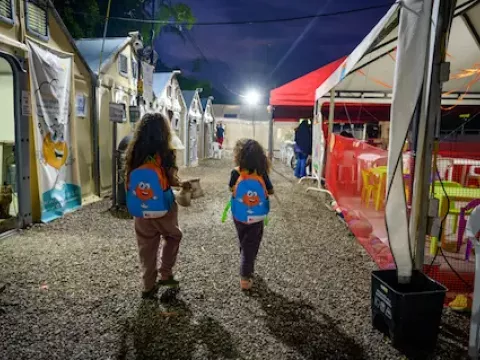Venezuela – humanitarian crisis in the shadows

By: Joao Helder Diniz
The massive exodus of citizens leaving Venezuela is currently considered one of the biggest humanitarian crises on the globe. It is estimated that more than 2 million Venezuelans have left their country in search of better living conditions and security.
Despite the size of the exodus and the prolonged instability that erodes what was once one of the richest nations of the Americas, this humanitarian crisis is growing in the shadows, with little attention from international organisations and without becoming a subject of discussion in global capitals.
Migrants leave behind dreams, studies, a heritage devastated by rampant violence, and in many cases, the family – in addition to their home and the land where they were born. Family dismemberment is one of the most painful consequences of forced migration.
The routes of Venezuelan migrants criss-cross Ecuador, Brazil, Colombia, and Peru. World Vision, which has a presence in 14 countries in the region, has also detected traces of this human tide in places as distant as Chile and Costa Rica. In this situation, and facing a crisis of immense proportions, the organisation has activated a tri-national humanitarian response in Colombia, Ecuador, and Brazil, as well as in Peru. This response is cemented in partnerships to face the massive challenge of receiving and serving with dignity and love the thousands of Venezuelans, and especially their children.
In Cucuta, Colombia, which borders Venezuela, the Simon Bolivar international bridge receives more than 5,000 people daily. Migrants walk for days with children on their backs, in search of food, medicine, and work. In this community, and together with the Colombian authorities, World Vision has developed an intense vaccination campaign against measles, preventing migrants from becoming a source of infection.
Likewise, World Vision Colombia implemented the Esperanza Sin Fronteras (Hope Without Borders) project, an initiative aimed at serving Venezuelan migrants, indigenous populations, and host communities. The project focuses on child protection, food security and nutrition, improving livelihoods for affected families, and transforming educational institutions into protective spaces for children. In this effort, working with churches and faith-based organisations at the community level has been essential to expand our reach.
On the other hand, it is estimated that Peru has received 694,000 Venezuelans, of whom more than 450,000 remain in the country. Entering the formal labour market is considered a possibility for only 12% of this number. World Vision concentrates our work in the bordering community of Tumbes, where the Binational Border Care Center (CEBAF in Spanish) was created, a multi-pronged effort in which the Peruvian government, together with other non-governmental organisations, seeks to receive and help more than 2,000 migrants crossing the border each day.
In a first stage, World Vision Peru will provide shelter, which will include safe spaces for children. We will also work hand-in-hand with the population by raising awareness about xenophobia and bullying. Breastfeeding, vaccination, and other basic health services are also promoted to protect children. In this way, World Vision, civil society, and governments can work together to make a difference.
Due to the lack of livelihoods and the misery that threatens Venezuelan migrants, World Vision Ecuador has focused its attention on providing coupons to heads of families. These can be exchanged for food, medicines, and hygiene products. In addition, together with local organisations, World Vision is promoting the development of livelihood projects so that migrant families can generate income for self-support.
In Brazil, the installation of safe spaces for children in shelters has allowed the care of thousands of children between 3 and 12 years old. Upon arrival, families receive a kit with basic supplies.
The reality of thousands of Venezuelans expelled by the instability of their country requires the focused attention of governments, corporations, civil society, churches, and the international community. Our humble calling is that it takes a world to help migrants. Without the active participation of different sectors, we will not be able to help families, children, and adolescents as a priority. Friendly and safe spaces for children, a contribution of World Vision in the framework of humanitarian emergencies, are a priority to safeguard the physical and emotional health and well-being of children.
To that end, our teams ensure that children receive adequate psychosocial care to process the physical and emotional exhaustion that comes from long walks or bus trips to leave their home country. The friendly spaces also allow children and adolescents to be precisely what they are: children. There they are fed, they sing, they paint, and they receive attention to mitigate the forced disintegration of families and to protect them from sexual predators and trafficking networks that threaten these particularly vulnerable populations.
A central element of our response is awareness-raising, in order to avoid xenophobic outbreaks at all costs and to promote the solidarity of the host populations and the resilience of those seeking better conditions.
Those of us who live in the security and stability of our countries need to recognise that forced migration is a painful process of uprooting, abandoning the 'normalcy' of life, entering unknown and dangerous territories, and encountering criminal elements that exploit and abuse travellers.
Indifference to this reality is not an option. We must all become a part of this movement in order to mitigate their pain, suffering, and loss so they can reclaim their lives and move forward with hope.